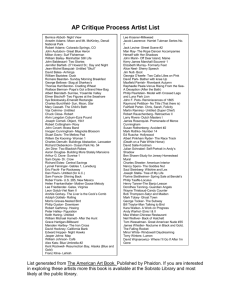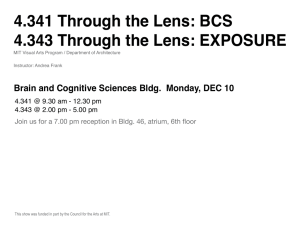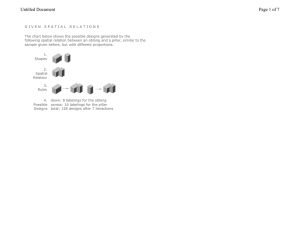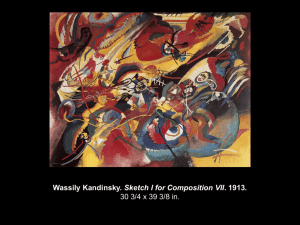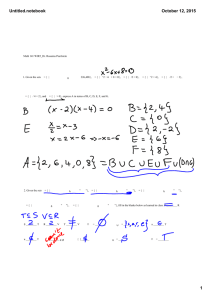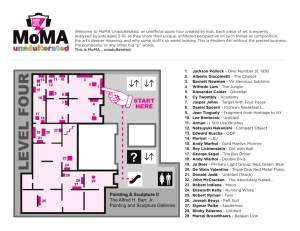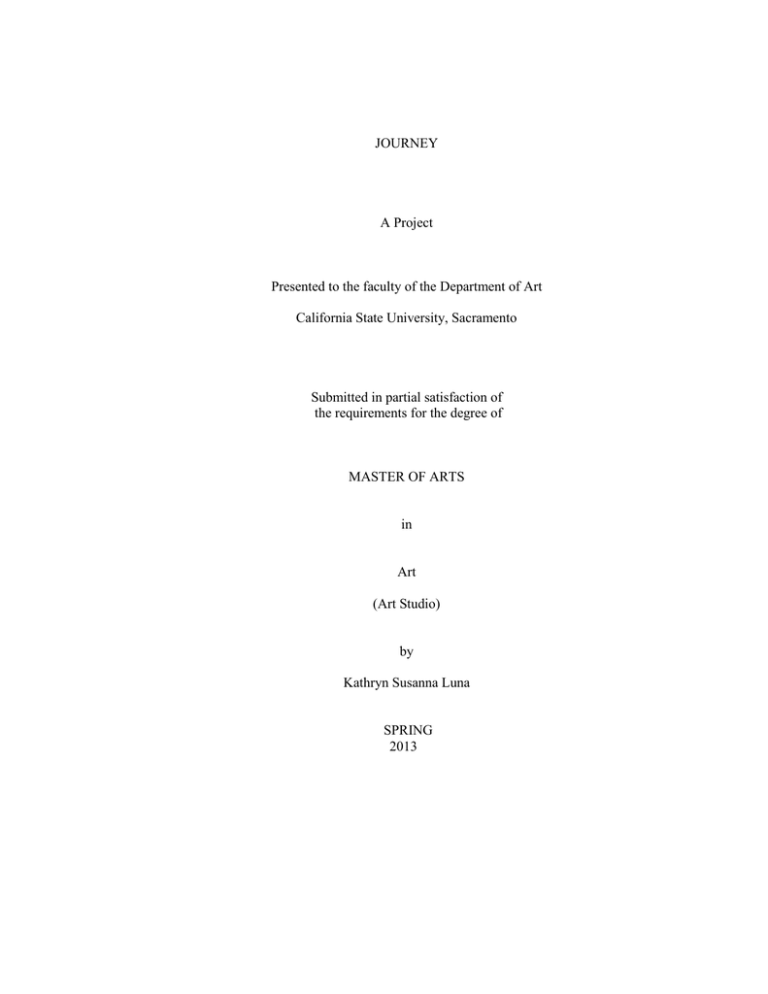
JOURNEY
A Project
Presented to the faculty of the Department of Art
California State University, Sacramento
Submitted in partial satisfaction of
the requirements for the degree of
MASTER OF ARTS
in
Art
(Art Studio)
by
Kathryn Susanna Luna
SPRING
2013
© 2013
Kathryn Susanna Luna
ALL RIGHTS RESERVED
ii
JOURNEY
A Project
by
Kathryn Susanna Luna
Approved by:
__________________________________, Committee Chair
Sarah Flohr, M.F.A
__________________________________, Second Reader
Andrew Connelly, M.F.A
____________________________
Date
iii
Student: Kathryn Susanna Luna
I certify that this student has met the requirements for format contained in the University format
manual, and that this project is suitable for shelving in the Library and credit is to be awarded for
the project.
__________________________, Graduate Coordinator
Andrew Connelly, M.F.A
Department of Art
iv
___________________
Date
Abstract
of
JOURNEY
by
Kathryn Susanna Luna
I entered into the Masters of Arts program with a determined mission in mind that is to
push beyond the boundaries of my aesthetic, understand the meaning of my work and decide if art
is the field, I want to pursue. In the process of going through the Masters of Arts program at
Sacramento State, I have discovered the dynamics of the self and the influence of others. How
they have exceedingly driven the boundaries of my work beyond what I ever imagined. The
culmination of reading many books, blogs, theories, trips to the museums, galleries, attending
lectures, studying historical and contemporary artists, discussions amongst my peers and
professors, late nights spent in the studio, and all the in between have made it possible and
worthwhile to emerge as an engaged artist into the art world. I will walk away with confidence in
myself, the appreciation, discipline and dedication of a practicing studio artist, improved skills
presenting museum/gallery worthy presentation of my work, the constructive criticisms that will
float in my head while I sit
v
and stare at my work. In addition, I have a better understanding and appreciation for other art
practices and theories.
_______________________, Committee Chair
Sarah Flohr, M.F.A
_______________________
Date
vi
ACKNOWLEDGEMENTS
Diana, my life long friend and my sister. We have shared twenty plus years of
laughter, tears, and silly adventures. You have been a true friend that has seen me grow
throughout all these years. Olesia, Joanne, Christal, and Cynthia thank you for your
patience and understanding during the long hours, days and months spent at the studio.
Momma, you have shown me what it takes to work hard. Through your
dedication and passion for gardening, you reminded me to always thank the Lord for all
my blessings and pray when times are tough. Angie, thank you for putting up with your
little sister and kicking me out to the garage and paint during the wee hours of the night.
The Grad crew, Afsaneh, Mehry, Carter, Emily, Chris, Roberta, Kerry, and Minh
thank you for all of your help, support, hugs, and all the times spent at ASL.
Andrew, Sarah, Tom, Ian and Dr. Frye thank you all for your wonderful guidance,
support, wisdom, and pushing through my boundaries in my work and myself. Andrew,
thank you for your unwavering support from the very beginning of the Master of Arts
program. Sarah, thank you for your soft spoken encouragement and telling me to have
fun while making work. Tom, thank you for pushing me to view my work in a different
light. Ian, thank you for ingraining in my head that regardless of the subject the emotions
will show up in the work.
vii
TABLE OF CONTENTS
Page
Acknowledgements....................................................................................................... vii
List of Figures................................................................................................................ ix
I LIKE A CHALLENGE............................................................................................... 1
MAKING MUD PIES ................................................................................................... 1
CONSTANT CHANGE................................................................................................. 2
CAUTION...................................................................................................................... 4
BITTERSWEET TRANSCENDENCE………………………………………………. 4
LANDSCAPE + HOME = SOUL ................................................................................. 5
TRIBUTE ...................................................................................................................... 6
LEAVING THE NEST................................................................................................... 7
Bibliography…................................................................................................................16
viii
LIST OF FIGURES
Figures
Page
1.
Figure 1 Untitled, 2011, Sumi Ink on paper, 39” x 28”…………………………. 8
2.
Figure 2 Untitled, 2011, Mix media installation .................................................. 8
3.
Figure 3 Landscape Diary 1(detail), 2012, 11’ x 720”.......................................... 9
4.
Figure 4 Domestic Celebration, (2012), mix media installation, size vary........... 9
5.
Figure 5 Untitled, 2012, mix media installation, size vary.................................... 10
6.
Figure 6 Caught in the Wind, 2012, mix media installation, size vary.................. 10
7.
Figure 7 Absence, 2012, mix media on canvas, 36” x 48”.....................................11
8.
Figure 8 March, 2012, mix media on panel, 35” x 46 ½”.......................................11
9.
Figure 9 Untitled, 2013, mix media on panel, 43” x 36”........................................12
10.
Figure 10 Untitled, mix media on canvas, 36” x 48”..............................................12
11.
Figure 11 Untitled, 2013, mix media on canvas, 38” x 96”....................................13
12.
Figure 12 Untitled, 2013, mix media on canvas, 38” x 96”....................................13
13.
Figure 13 Untitled, 2013, mix media on panel, 20” x 36”......................................14
14.
Figure 14 Untitled, 2013, mix media on panel, 60” x 48”......................................14
15.
Figure 15 Untitled, 2013, mix media on panel, 48” x 72”......................................15
ix
1
I LIKE A CHALLENGE
I like challenges. My mission as an artist is to experience all of the challenges
inherent to surpassing a goal. What I did not realize however, is how much work, dedication,
and focus it takes to be a disciplined artist. There have been many trying times that I would
ask myself why would I want to become a Masters of Arts in Studio Art. What is this all for?
Why study in the arts? One thing that stays true, I do not give up easily; I will kick, scream,
grumble, and sometimes have the need to hide and curl up in the corner for a moment until I
can find the smallest strength to become motivated to work until a piece feels right.
MAKING MUD PIES
There are enough of my relatives and family members in the medical field. Making
something artistic has been with me for as long as I can remember. There is rumor amongst
my family of being related to an internationally known romanticist painter, Juan Luna, who
painted Spolarium (oil on poplar, 160" x 280"), which was submitted to the Exposición
Nacional de Bellas Artes in 1884 in Madrid. During my adolescence, I remember making
mud pies and scarecrows while my parents tended to the gardens, creating line drawings of
the ceramic Siamese cat sitting in my aunt's living room, sketching mountains and trees
during camping trips, and copying roses from my sister’s wedding invitation catalog.
Twenty years ago, my perspective on life changed in a moment when I endured a personal
family tragedy. I lost all drive and motivation to make anything creative. However, as time
continued I began striving to regain my passion for creating art.
2
CONSTANT CHANGE
I applied to the Masters of Arts program in order to find out for myself if I had what
it takes to be an artist and discover where my artistic abilities might take me. For the past
three years it was difficult to find depth in my work. In addition, four years ago I applied to
the Masters of Arts Studio Art program to realize my goal of becoming a professional and
practicing artist. I submitted a portfolio of all-over compositions of imagined landscapes
created on life size Tanson paper surfaces. This body of work contained many layers of
mountainous ranges, peaks, valleys, waterfalls, trees and the intuitive figures formed using
various ink washes, as well as various opaque and translucent watercolors and pastels. The
intention of this work was to take the viewer on an expedition along the vibrant pathways,
allowing them to move naturally in all sorts of directions. Though the work was pleasing and
beautiful to the eye, I could not find a connection to it. The style and direction of my work
constantly changed as I hoped to find a niche, a place of deeper meaning.
There were many failed attempts in the last three years, but without those failed
attempts, there could be no respect for art, the creator and the creation of art. For my own
selfish need to have meaning and work with different mediums and materials, pushing myself
every semester to experiment and do something different. The first year in the Studio Art
program, I worked with paper and canvas, creating space through landscape using ink and
washes with traditional and non-traditional brushes such as (figure 1) Untitled and (figure 3)
Landscape Diary. The second year was a transition, a time to think outside of the box. I
continued to work with paper, but also attempted to utilize the gallery space as part of the
work, such as the grid wall piece installed at the Robert Else Gallery at Sacramento State,
Untitled (figure 2).
3
Over the years, an understanding emerged that I did not want the work to be just
“beautiful,” or to be representative of “Chinese Landscapes”. In fact, I have tried to stay clear
from representing Chinese Landscapes because I felt I was unaware of the proper traditional
methods to paint in this way. Yet, I educated myself on Chinese Landscape painters and their
methods of approaching the surface. I am now at ease having to understand more clearly how
Chinese Landscape sometimes reflects in my work. In close proximity, the landscape flattens,
juxtaposed with areas of great space when viewed from clear across the room. In addition, I
use landscape as a means of allowing my spirit to roam in the work. Along with the eastern
aesthetic, western methods similar to Jackson Pollock are applied. I emulate his process by
working flat on the floor and from all sides.
The use of creating imaginative landscapes are a means of expressing my emotions,
however the thoughts I was trying to convey were never evident in the work as intended.
During my first advancement show, I painted an ephemeral painting on the gallery walls of
the Robert Else Gallery (see figure 2) at Sacramento State. A red and blue grid is painted
directly onto the wall juxtaposed with overlapping organic landscape appliques. This time
around, my work was at an infancy stage. It was a time of bewilderment, not knowing what
to do while trying to avoid landscapes. The following semester I returned to painting
landscapes, but this time on Japanese rice paper scrolls shown in detail in figure 3 Landscape
Diary (11” x 720”) . I used the scrolls as a diary to maintain a steady and consistent studio
practice, painting each day six to twelve feet per week until I reached the end. In trying to
understand why I kept returning to painting landscapes.
4
CAUTION
Painting colorful landscapes was a means of escape, yet it also obstructed a path to
truth. I had yet to probe deep and paint from within my soul. To achieve this, I studied the
subject of using the emotions, materials, and objects to redress a grievous family memory. In
many discussions about emotive art, shared with those who knew my past, and warning me to
heed caution of a cathartic process. Nevertheless, I was determined to proceed with the
subject; it seemed the only route to surmount suppressed emotions.
BITTERSWEET TRANSCENDENCE
My first attempt in fall 2012, the second advancement, was a tough one. I stressed
myself to delusional exhaustion because I had no option but to pass this final attempt at
advancement. The pressure was immense, and working with a difficult upbringing as my
motivation in the work contributed to the high emotion of the project. This time around, it
was simultaneously a bittersweet failure, and a successful attempt. The work was earnest, and
I was pleased that I had finally found meaning in my work, but still the work failed in some
ways to express emotion fully. My method of creating changed again, creating next a body of
work mixed with textured landscape and figurative paintings in three different installations.
The only thing consistent in the work was the subject. What failed was that I could not
discuss the work itself without being emotional of the memory. The use of the materials was
both over the top dramatic, and at its worst, literal. That was the warning my peers cautioned
about.
Ultimately, I made the decision of incorporating my family members along with
landscapes, having always thought of landscapes as a means to escape, or to sit in silence
5
with nature. For my advancement this time, not only did I include landscapes into the work,
but I also added figures and texture. For example, Domestic Celebration (see figure 4) is a
wall installation of painted family gatherings affixed to a collage of torn documents and
letters onto kitchen cabinet surfaces. It was a first attempt to delve into the suffering of
tragedy. I was potentially on the right track, but it still did not feel right; meanwhile my peers
once more warned of working with a topic that provoked such intense psychological
processes. My advancement was a mix of paintings and installation, and yet the abstracted
landscapes and figures were not speaking of the tragedy that was supposed to be the center of
the work. It seemed to have the correct elements, but the colors were overwhelming and I
was yet again all over the place.
LANDSCAPE + HOME = SOUL
My second attempt dealing with the subject was better. This final semester of work, I
believe hit home for me. I used lots of texture, rips and tears into the canvas or wood panel,
and applied sand, many layers of paint, and ephemeral moss. My method is the process itself:
painting many layers into the work, painting over areas that felt incomplete or ill-fitting,
adding text from a 20-year old deposition statement related to the great tragedy, and using
wallpaper motifs of home. In this manner, landscapes became my means of recognizing the
past. My color palette changed from exotic tropical colors to more somber hues. The
composition has also reduced from overwhelming layers of mountain ranges, waterfalls,
trees, peaks and valleys to atmospheric misty landscapes with the interruption of rips in the
canvas, and surfaces of a home exterior concrete, notes recessed, flat, or raised in the work
and slightly hidden. This final series of work is about the in-between, the confusion, the gray
area - my soul.
6
A home resides on a landscape, weather it is in the suburbs, the city, out in the desert
or in the country. My source of the work comes from persons residing in a home and one day
abandoning or moving on from that place to some place new. All the history of an abandoned
or run-down home with holes in the walls, wallpaper tearing from rotted drywall, moss
growing in between the cracks of exterior walls, wood gouged out or patched up. The
structure of a home becomes like the body of soul.
TRIBUTE
Not all these efforts have achieved of my own doing, but rather paying tribute to the
entire experience of the graduate program. The artists I have grown to adore, my immediate
peers and professors constructive criticisms and their overwhelming support and collective
concern have each contributed to my personal growth as an artist. The readings, lectures,
visiting artists, trips to museums and galleries have opened my eyes to the infinite knowing
of “What is Art”. The gatherings and discussions held in the graduate common area and the
back of ASL for the occasional smoke break-discussion, the home projects and doodles on
my iPad, the small art community gathered in ASL, and Kadema at Sacramento State has
become a new family that lent strength to the challenging process of doing art through
emotion.
I always thought it was taboo to look at other artists like it was cheating in some sort
of way. I have now crossed to the other side; to research with openness and look to other
artists for influence. Three artists come to mind who have had great influence on my new and
continuing artistic direction. These include Louis Bourgeois, Ai WeiWei, and Anselm Keifer.
I admire Louis Bourgeois for her courageous creativity to express betrayal, frustration and
7
abandonment that she felt towards her family, which is evident in her sculptures and
drawings. I love and find courage in Ai WeiWei statement about being human,
I think being human, that both life and death have a secret side but there’s the temptation
to reveal the truth and to see the fact that you need some courage or understanding about
life or death. So even if you try to reveal or open yourself, you’re still a mystery, because
everybody is a mystery. We can never understand ourselves. However, we act or
whatever we do is misleading. So in that case, it doesn’t matter” (p.20, Secrets).
Finally, I appreciate the German painter and sculptor Anselm Keifer for his brave effort to
address his culture’s dark past with wonderfully dark and somber textural paintings of soot,
mud, clay and other unusual materials. My own talent is deeply impressed by methods,
materials, and essence of these artists’ works.
LEAVING THE NEST
I will never forget the memories or the experience of being a graduate student in the
Sacramento State University Art program. I am satisfied that I made the right decision to
pursue my Master of Arts degree of Studio Art, confident that I have surpassed the challenges
I had set before myself as I entered into the program.
8
FIGURES
Figure 1 Untitled, 2011, Sumi Ink on paper, 39” x 28”
Figure 2 Untitled, 2011, mix media installation, size vary
9
Figure 3 Landscape Diary 1(detail), 2012, 11” x 720”
Figure 4 Domestic Celebration, (2012), mix media installation, size vary
10
Figure 5 Untitled, 2012, mix media installation, size vary
Figure 6 Caught in the Wind, 2012, mix media installation, size vary
11
Figure 7 Absence, 2012, mix media on canvas, 36” x 48”
Figure 8 March, 2012, mix media on panel, 35” x 46½”
12
Figure 9 Untitled, 2013, mix media on panel, 43” x 36”
Figure 10 Untitled, mix media on canvas, 36” x 48”
13
Figure 11 Untitled, 2013, mix media on canvas, 38” x 96”
Figure 12 Untitled, 2013, mix media on canvas, 38” x 96”
14
Figure 13 Untitled, 2013, mix media on panel, 20” x 36”
Figure 14 Untitled, 2013, mix media on panel, 60” x 48”
15
Figure 15 Untitled, 2013, mix media on panel, 48” x 72”
16
BIBLIOGRAPHY
Smith, Karen, Hans-Ulrich, Bernhard Fibicher, and Weiwei Ai. Ai Weiwei. London:
Phaidon, 2009. Print

